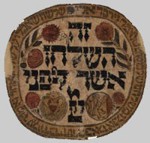Exhibitions archive

Jamim mikedem - Old Jewish Postcards
From 01. 03. 2000 to 31. 08. 2000
Spanish Synagogue, 1 March - 31 August 2000
Postcards featuring Jewish subject matter are a mere fragment of the thematically diverse range of the postcards from the period 1898 to 1938. They capture the long lost world of European Jewry, who at the beginning of the 20th century experienced a culmination of their long-standing efforts to achieve emancipation and equality. This world was almost completely destroyed by the catastrophe of the Shoah during the Second World War.

Genizot - Findings in Bohemian and Moravian Synagogues
From 04. 11. 1999 to 30. 01. 2000
Spanish Synagogue 4. November 1999 - 30. January 2000
The exhibition Genizot documents one of the lesser known aspects of Jewish tradition. According to Jewish law, discarded Holy Scriptures which contain the name of God must be deposited in a safe place, where they are protected from desecration and subject to natural processes of decay. This also applied to other texts of a religious and even secular nature, written in the Hebrew language or script. The place of storage is known as a genizah (plural: genizot, from the Hebrew root GNZ - literally ”hiding, storing”).

Murder in Polná - Exhibition to mark the centenary of the Hilsner Affair
From 17. 06. 1999 to 03. 10. 1999
Spanish Synagogue: 17 June - 3 October
Polna Synagogue: from November 1999
The myth of Jewish ritual murder, known as the blood libel, came into being at a time of religious intolerance, crusades and persecution of Jews. The first blood libel case occurred in 1235 in Fulda, Germany, and the most infamous case took place in 1475 in Trent, Italy. These accusations had tragic consequences, with the torturing of hundreds of Jews, pogroms and expulsions. In the 17th century the blood libel was particularly widespread in Eastern Europe. Not a single case was ever proved and the myth was often refuted by experts, as well as by secular and church authorities.



![[subpage-banner/3_Programavzdelavani_3.jpg]](https://c.jewishmuseum.cz/images/subpage-banner/3_Programavzdelavani_3.jpg)
![[design/2013/Twitter.png]](https://c.jewishmuseum.cz/images/design/2013/Twitter.png)
![[design/2013/Instagram.png]](https://c.jewishmuseum.cz/images/design/2013/Instagram.png)

![[homepage-banner/incident.jpeg]](https://c.jewishmuseum.cz/images/homepage-banner/incident.jpeg)